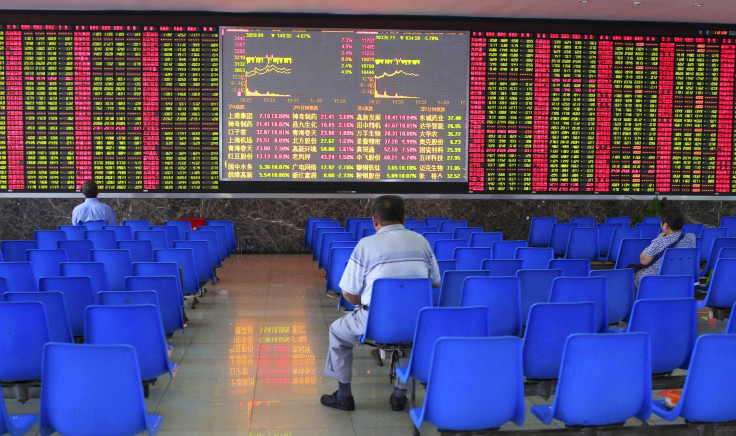Chinese And Some Asian Shares Fall Again As Worries About China's Economy, Possible Fed Rate Hike Persist

SHANGHAI -- Shares in China and several other Asia-Pacific nations fell again Monday amid continuing concerns about the health of China’s economy, and U.S. Federal Reserve Vice Chairman Stanley Fischer’s remarks that the Fed had not ruled out an interest rate rise in September.
In Tokyo the Nikkei finished the day down almost 1.3 percent. Analysts said profit-taking was one reason for the fall, as investors sought to lock in gains made during the market’s rebound in the second half of last week. But investor sentiment was also affected by news that Japanese industrial output had fallen unexpectedly by 0.6 percent in July, with some analysts citing weak demand from China as a factor. Singapore’s Straits Times Index also fell Monday, dropping about 0.7 percent, while Australia’s ASX 200 was down nearly 1.1 percent.
There were some positive notes: South Korea’s Kospi Index recovered from a drop in morning trading to close 0.2 percent higher, while Hong Kong’s Hang Seng, which had fallen more than 1 percent Friday, also reversed morning falls to close 0.27 percent up.
In China, however, shares were back in negative territory, after regaining more than 10 percent Thursday and Friday, following their dramatic fall of 18 percentage points between last week's “Black Monday” and Wednesday. The main Shanghai Composite Index fell 3 percent Monday morning, before recovering some of its losses to close 0.8 percent lower at just under 3,206. However, that still left it more than 12 percent down for the month of August, following a drop of more than 14 percent in July.
The secondary index in Shenzhen also fell, by just over 3 percent, leaving it down 15.8 percent for the month -- its worst monthly loss in seven years, Hong Kong’s South China Morning Post reported. Shenzhen’s ChiNext index for high-tech stocks, meanwhile, lived up to its reputation for volatility: after climbing more than 6 percent last Friday, it fell almost 4.1 percent, leaving it 21 percent down on the month.
The falls on China's markets again raise questions about the success of the Chinese government’s attempts to calm investor sentiment. The markets had jumped Friday on the news that China’s state pension fund would invest more than $300 billion in shares in the near future. And at the weekend the government removed a cap on commercial banks’ loan-to-deposit ratios -- previously set at 75 percent of deposits -- in a move seen as designed to encourage lending to businesses, boost the real economy, and reduce the prevalence of shadow banking in China.
The move followed remarks by Chinese Premier Li Keqiang, who told a meeting of China’s top leadership that the yuan would remain “basically stable” following its devaluation earlier in the month. Li was quoted by state media as saying there was no basis for continued depreciation of the yuan, the economy was generally sound, and China would pursue a “proactive fiscal policy and prudent monetary policy.” The official Global Times newspaper said Monday Li’s comments “should help restore investor confidence.”
However, anxiety remains about latest official figures on China's manufacturing output due to be released Tuesday. And the Global Times quoted economic forecaster Xu Hongcai as saying GDP growth might fall to 6.8 percent or 6.9 percent in the third quarter, below the second quarter official figure of 7 percent, as a result of slowing exports and the falls in the stock market. However, Xu predicted monetary easing would see a return to growth of 7 percent in the final quarter of 2015.
Chinese state media also continued to emphasize the government’s line that recent market volatility is partly linked to illegal manipulation. State television Sunday showed an interview with Wang Xiaolu, a reporter from influential financial news magazine Caijing, in which he confessed to making mistakes in his reporting of a story last month that predicted the government was planning to stop its large-scale intervention to prop up the country’s stock markets. The authorities are also reported to have closed a number of social media accounts, which they said had spread rumors about the stock market and other topics. And an official from China's stock market regulator, Liu Shufan, has also been detained, accused of taking bribes to help companies list on the market, and of insider trading.
The Financial Times also reported at the weekend that Beijing was planning to cut back on the large-scale purchase of shares -- an effort intended to shore up the market -- and would instead target people it believed were destabilizing the market. The Chinese government has yet to comment on the report.
© Copyright IBTimes 2024. All rights reserved.












